Belief in Allah
The Meaning of Belief in Allah ﷻ
This means firm belief that Allah ﷻ exists, resolutely affirming His Lordship, Godship and Names and Attributes.
We will now discuss these four issues at length as follows:
The Innate Disposition to Believe in Allah (Fitrah)
Affirming the existence of Allah is something that is innate in human beings and does not require anything to prove it. Indeed, it is for this reason that most people acknowledge God’s existence despite their different religious beliefs.
We know in our heart of hearts that Allah exists because we always seek His assistance and support in times of hardship or when a calamity strikes because of the innate inclination to believe in Him and worship Him (fitrah) which He has instilled into us even though some people attempt to obliterate it or ignore it.
The numerous incidents we have heard or seen about people having their prayers answered, their wishes granted and their distress relieved proves beyond any shadow of doubt that Allah ﷻ does exist.
Proofs for Allah’s Existence are Clear and Countless
- Everybody inherently acknowledges the laws of causality, that is, everything has a determinate cause. The numerous creatures we see around us must have a causative agent, that is undoubtedly Allah, for it is impossible for anything to be created without a creator, just as it is impossible for it to create itself, as the verse states, “Or were they created out of nothing, or are they the creators?”(Soorat At-Toor, 52:35) This verse simply means that people were not created without a Creator, nor could they have created themselves, which obviously means that it was Allah ﷻ who created them.
- The superbly flawless plan in the universe, including its most subtle elements, its heaven, earth, constellations and trees, among numerous other great marvels and impressive wonders, prove without a doubt that it has one Creator who is Allah, as the verse states, “This is the handiwork of Allah who has perfected all things.” (Soorat An-Naml, 27:88)
All the stars and planets, for instance, consistently orbit around their respective common centre of mass.
As the Qur’an states, “The sun cannot overtake the moon, nor can the night outrun the day: each floats in its own orbit.” (Soorat Yaa Seen, 36:40)

Man himself is one of the major signs which testify to Allah’s existence. We only need to reflect on the blessings of reason, the senses and the well-proportioned and perfectly designed bodies with which Allah ﷻ has endowed us, as the Qur’an states, “There are certainly signs [of Allah’s existence] in yourselves as well. Do you not then see?” (Soorat Add-Dhaariyaat, 51:21)
The Meaning of Belief in Allah’s Lordship
This means to firmly believe that Allah ﷻ is the Lord, the Creator, the Sustainer and the provider of everything; that He is the one who gives life and causes death; that He is the only one who can do harm and good; that all power of decision rests with Him; that in His hand is all good; that He has power over everything; and that He has no partner whatsoever in doing all this.
Belief in Allah’s Lordship therefore requires a Muslim to believe that:
|
Allah is the only creator of everything in the universe, as the Qur’an states, “Allah is the Creator of everything.” (Soorat Az-Zumar, 39:62) Man’s creativity merely involves such processes as transforming something from one state into another, assembling and building; it does not involve originating creation, creating something out of nothing or bringing it to life after death. |
| He is the only One who provides sustenance to His creation and no one else can do so, as the Qur’an states, “There is no creature on the earth which is not dependent upon Allah for its provision.” (Soorat Hood, 11:6). |
| He is the master and owner of everything “The kingdom of the heavens and the earth and everything in them belongs to Allah.” (Soorat Al-Maa’idah, 5:120). |
|
He is the sole ruler who regulates all affairs of the universe: “He directs the whole affair from heaven to earth.” (Soorat As-Sajdah, 32:5) Man’s management of his worldly affairs is rather limited and depends on whatever material is at his disposal. Besides, in so doing, he can either meet with success or experience failure. However, Allah’s regulation of the affairs of the universe is comprehensive and is bound to be effectual, for there is nothing that would otherwise thwart it in any way, as the Qur’an states, “Both creation and command belong to Him. Blessed be Allah, the Lord of all the worlds.” (Soorat Al-A‛raaf, 7:54). |

“There is no creature on the earth which is not dependent upon Allah for its provision.” (Soorat Hood, 11:6)
The Arab Polytheists at the Time of the prophet ﷺ Believed in Allah’s Lordship
The Arab polytheists at the time of the prophet ﷺ affirmed Allah’s Lordship; they believed that He is the creator, the master and disposer of all affairs, but such affirmation alone was not sufficient for them to be admitted into the fold of Islam. As the Qur’an states, “If you asked them, ‘Who created the heavens and the earth?’ they would say, ‘Allah!’ Say: ‘Praise be to Allah!’ But most of them do not know.” (Soorat Luqmaan, 31:25)
Indeed, affirmation that Allah is the Lord of all the worlds, that He is the master and sustainer entails that all acts of worship must be directed to Him alone, without taking any partners whatsoever with Him in worship.
It would be ludicrous to affirm that Allah is the creator of everything, the disposal of all affairs and the one who gives life and causes death and then we direct an act of worship to other than Him. Indeed, doing so is a tremendous wrong and the worst of all sins, as the Qur’an states, “When Luqmaan said to his son, counselling him, ‘My son, do not associate anything with Allah. Associating others with Him is a terrible wrong.’” (Soorat Luqmaan, 31:13)
When the prophet ﷺ was asked about the greatest sin in the sight of Allah, he replied, “To set up a rival to Allah in worship though He alone created you.” (Saheeh Al-Bukhaaree: 4207; Saheeh Al-Bukhaaree: 86)

Belief in Allah’s Lordship Sets the Heart at Rest
When one firmly acknowledges that none of Allah’s creation can challenge His decree, being the creator and king of all mankind who decrees whatever He deems wise for them, who is their only creator, sustainer and disposer of all affairs, whom nothing as small as an atom moves or settles except with His decree, one’s heart becomes attached to Almighty Allah, asking none but Him, relying on Him in all worldly matters and dealing with all the ups and downs of life calmly and confidently, with determination and perseverance. For once we have done what we can possibly do to achieve a worldly goal and have prayed to Allah for assistance, we have actually done our duty. In this way, we become contented, as we do not covet what others may have, fully aware that all power of decision rests with Allah who creates whatever He wills and chooses for mankind whatever is best for them.

Belief in Allah’s Lordship sets the heart at rest .
What Does this Mean?
This means firm belief that Allah is the only true god who deserves to be worshipped. This entails that all the apparent and hidden acts of worship, such as invocation, fear, reliance, the prayer, the obligatory charity (zakaat), fasting and seeking assistance, must be directed to Him alone, as the Qur’an states, “Your God is One God. There is no god but Him, the Most Beneficent the Most Merciful.” (Soorat Al-Baqarah, 2:163)
This verse makes it abundantly clear that Allah is only one God, which means that He alone deserves to be worshipped and that no one else must be worshipped besides or instead of Him.

Declaring Allah’s oneness and directing all acts of worship to Him alone is the actual realisation of the meaning of the statement Laa ilaaha illallaah.
Importance of the Belief that Allah is the Only God Worthy of Worship
The importance of the belief that Allah is the only God who deserves to be worshipped is apparent in a number of aspects:
1
Worshipping Allah is the ultimate purpose of human and jinn existence, as the Qur’an states, “I have only created the jinn and man to worship Me.” (Soorat Adh-Dhaariyaat, 51:56)
2
Worshipping Allah is also the reason behind Allah’s sending messengers and revealing divine books to affirm that Allah is the only God worthy of worship and to reject false deities worshipped besides or along with Him, as the Qur’an states, “We sent a messenger among every people saying: ‘Worship Allah and keep clear of all false gods.’” (Soorat An-Nahl, 16:36)
3
Worshipping Allah is the first duty of man towards his creator. Giving instructions and orders to Mu‛aadh ibn Jabal t upon sending him to Yemen, the prophet ﷺ said to him, “You are going to a people from among the People of the Book. Let the first thing you call them to be to testify that there is no god worthy of worship except Allah.” (Saheeh Al-Bukhaaree: 1389; Saheeh Muslim: 19)
That is, let them direct all acts of worship to Him alone.
4
The belief that Allah is the only God worthy of worship is the actual realisation of the meaning of the statement Laa ilaaha illallaah. The Arabic word ilaah (generally translated ‘God’) refers to any being that is worshipped. Therefore, there is no God who truly deserves to be worshipped except Allah, and thus no act of worship must be dedicated except to Him alone.
5
The belief that Allah is the only God worthy of worship is the logical outcome of the belief that He is the creator, the master and the disposer of all affairs.
This involves belief in the names and attributes which Allah has affirmed for Himself or which His Messenger ﷺ has affirmed for Him in a manner that suits His majesty.
Allah ﷻ has the most beautiful names and perfect attributes. All His names and attributes are unique, as the Qur’an states, “Nothing is like Him, and He is the All-Hearing, the All-Seeing.” (Soorat Ash-Shooraa, 42:11) Therefore, none of whatever He has created has similar names or attributes in any way.
Some of Allah’s Most Beautiful Names
“The Beneficent, the Merciful.” (Soorat Al-Faatihah, 1:3)
“He is the All-Hearing, the All-Seeing.” (Soorat Ash-Shooraa, 42:11)
“He is the Mighty, the Wise.” (Soorat Luqmaan, 31:9)
“Allah, there is no god but Him, the Living, the Self-Sustaining.” (Soorat Al-Baqarah, 2:255)
“All praise is due to Allah, Lord of all the worlds.” (Soorat Al-Faatihah , 1:2)

Benefits of Belief in Allah’s Names and Attributes
1
Getting to know Allah ﷻ better, for belief in Allah’s names and attributes increases one’s knowledge of Allah, which in turn increases one’s faith in Him. Those who know and understand Allah’s names and attributes are bound to have their hearts filled with awe of Him and love for Him and tend to submit to Him alone.
2
Praising Allah by using His most beautiful names, which is the best form of remembrance of Allah (dhikr), as the Qur’an states, “O you who believe, remember Allah much.” (Soorat Al-Ahzaab, 33:41)
3
Asking and invoking Allah by His names and attributes, as the Qur’an states, “To Allah belong the Most Beautiful Names, so call on Him by them.” (Soorat Al-A‛raaf, 7:180) An example of this is to say, Yaa Tawwaab, tub ‛alayya! Yaa Raheem, Irhamnee! “O Most Forgiving, forgive me! O Most Merciful, have mercy on me!”
> The Meaning of Worship (‛Ibaadah)
The Arabic term ‛ibaadah comprises all the words and deeds which Allah ﷻ loves and approves of and which He has commanded or recommended, whether such words and deeds are apparent, such as the prayer, zakaat or pilgrimage; or hidden, such as love for Allah and His Messenger ﷺ, fear of Allah, reliance upon Him and seeking His assistance.
Worship Encompasses all Aspects of Life |
Worship (‛ibaadah) embraces all the believer’s acts if he intends to do them with the intention of getting closer to Allah ﷻ. Therefore, the concept of worship in Islam is not confined to the common rituals, such as the prayer and fasting; rather, it includes all beneficial acts that are done with good intentions. In this way, all the good acts a Muslim does are considered acts of worship for which he will be rewarded in the hereafter. If he eats, drinks or sleeps, for instance, with the intention of getting strength to be able to obey Allah, he will be rewarded for this intention. A Muslim, therefore, lives all his life for Allah. His eating to get strength to obey Allah, his marriage to keep away from unlawful sexual acts, seeking knowledge, getting a university degree, making discoveries, and a woman’s care for her husband, children and home are all acts of worship as long as they are coupled with a good intention.

All the good acts that are done with good intentions are considered acts of worship for which man will be rewarded.
The Reason behind the Creation of the Jinn and Mankind |
Allah says, “I have only created the jinn and man to worship Me. I do not require any provision from them and I do not require them to nourish Me. Truly, Allah is the Provider, the Lord of Power, the Ever Mighty.” (Soorat Adh-Dhaariyaat, 51:56-8)
Allah ﷻ informs us in this verse that the reason behind creating the jinn and mankind is to worship Him. In fact, He is not in need of their worship; rather, it is they who need to worship Him because of their total dependence upon Him.
If man neglects a duty towards his creator and gives free rein to the worldly pleasures without contemplating the divine reason behind his existence, he becomes just like any other creature without any privileges whatsoever over other creatures. Animals, too, eat and enjoy themselves but they will not be brought into account on the Day of Judgement, as man will be: “Those who reject Allah will enjoy this world and eat as cattle eat; and the Fire will be their abode.” (Soorat Muhammad, 47:12) By neglecting their duty towards their Lord, they are just like animals, but contrary to animals, they will be punished for their disobedience because, unlike animals, they have been endowed with the faculty of reason.
Pillars of Worship |
The kind of worship Allah has legislated is based on two important pillars:
The First Pillar: Total humility and fear
The Second Pillar: Complete love for Allah ﷻ
Therefore, worship (‛ibaadah), which Allah has commanded His slaves to observe must be accompanied with (1) total submission to, and humility before Allah while fearing Him, and (2) complete love for Him, asking, invoking and imploring none but Him.
Love that is not accompanied with fear and humility, such as love for food and wealth, cannot be considered worship. By the same token, fear that is not accompanied with love, such as fear of a ferocious beast or a tyrant ruler, cannot be considered worship. For worship to be realised when doing an act, both love and fear must be realised, and this can only be directed to Allah alone.
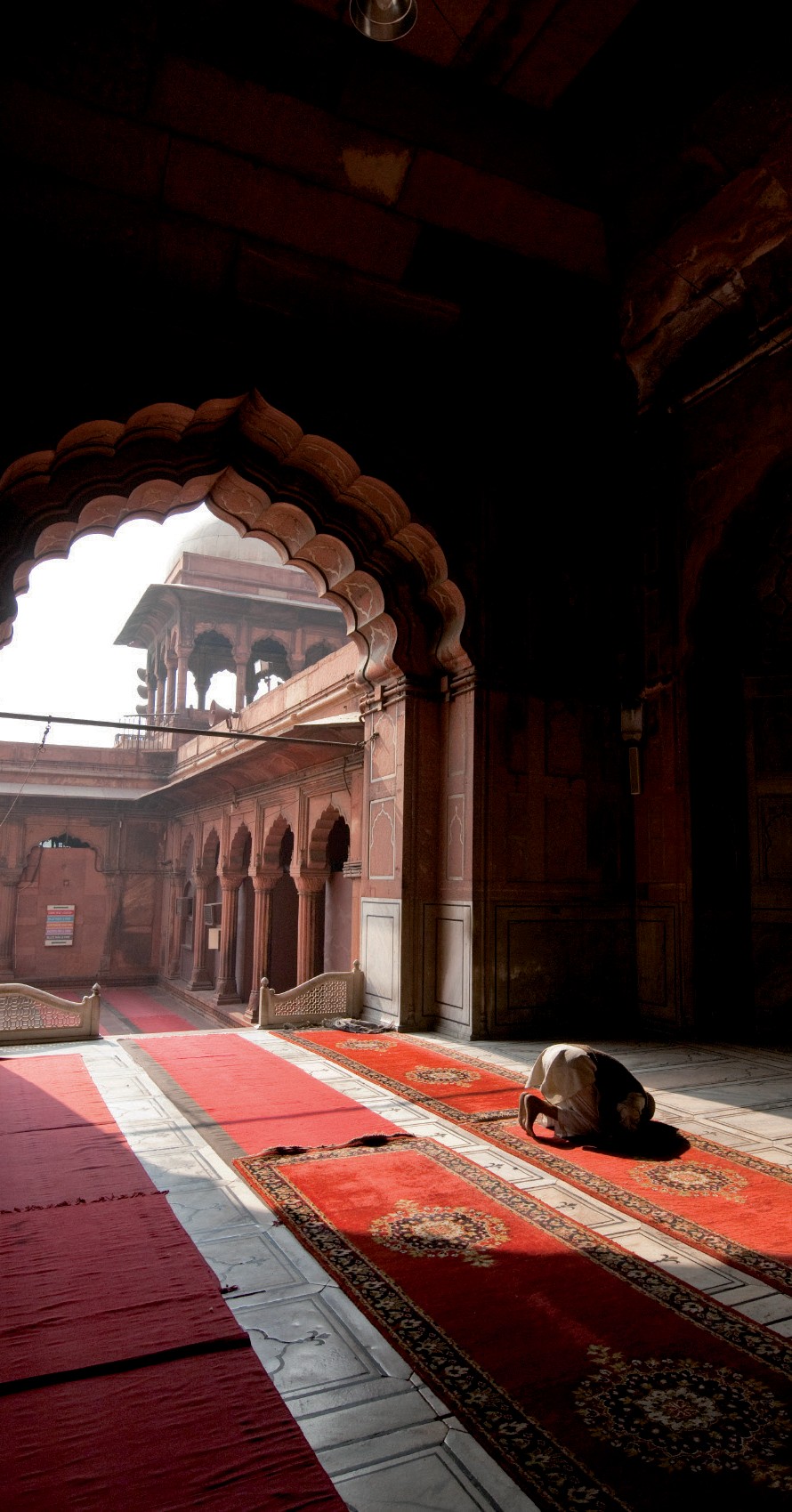
For worship, or ‛ibaadah, to be valid and accepted, it has to be directed sincerely to Allah alone and done in conformity with His Messenger’s Sunnah.
Conditions of Worship |
- For worship, or ‛ibaadah, to be valid and accepted, two conditions must be met:
-
1
Sincerity: It has to be directed sincerely to Allah alone.
-
2
Following the guidance of Allah’s Messenger ﷺ.
-
|
 |
> Associating Partners with Allah in Worship (Shirk)
- Shirk contradicts the belief that Allah alone is worthy of worship. While the belief that Allah alone deserves to be worshipped and that all acts of worship must be directed to Him constitutes the greatest and most important duty of a Muslim towards his Lord, shirk is considered to be the greatest sin in the sight of Allah and is the only sin which He never forgives without sincere repentance. The Qur’an says, “Allah does not forgive anything being associated with Him in worship, but He forgives whoever He wills for anything other than that.” (Soorat An-Nisaa’, 4:48) When the prophet ﷺ was asked about the greatest sin in the sight of Allah, he replied, “To set up a rival to Allah in worship though He alone created you.” (Saheeh Al-Bukhaaree: 4207; Saheeh Muslim: 86)
- Indeed, shirk renders acts of worship invalid and worthless, as the Qur’an states, “If they had associated others with Him, nothing they did would have been of any use.” (Soorat Al-An'aam, 6:88)
Those who commit the unpardonable sin of shirk will be doomed to Hellfire for all eternity, as the Qur’an states, “Those who associate anything with Allah in worship, for them Allah has forbidden Paradise and their abode will be the Fire.’” (Soorat Al-Maa’idah, 5:72)
Shirk is of two Types: Major Shirk and Minor Shirk |
-
Major Shirk: This involves directing any act of worship to other than Allah. Therefore, directing words or deeds that Allah loves to Him alone testifies to monotheism and true faith, while directing them to other than Allah constitutes an act of unbelief and shirk.
Examples of this type of shirk include asking someone other than Allah to cure one of an illness or to increase one’s wealth, relying on other than Allah and prostrating to other than Him.
Allah says, “Your Lord says, ‘Call on Me and I will answer you.” (Soorat Ghaafir, 40:60)
“Put your trust in Allah if you are indeed believers.” (Soorat Al-Maa’idah, 5:23)
“Prostrate before Allah and worship Him.” (Soorat An-Najm, 53:62)
Therefore, whoever directs any act of worship to other than Allah is, strictly speaking, an unbeliever.
-
Minor Shirk: This involves those words or deeds which serve as a vehicle to commit the major shirk.
Examples of this type of shirk include making one’s prayer sometimes a little longer or reciting the Qur’an a little louder for the sake of showing off. The prophet ﷺ once observed, “The thing that I fear most for you is the minor shirk.” His Companions asked, “What is the minor shirk, Messenger of Allah?” He replied, “Showing off.” (Musnad Ahmad: 23630)
However, if a person performs acts of worship entirely for showing off, and were it not for the sake of people he would never offer the prayer or observe a fast, then he is definitely a hypocrite. Doing so is undoubtedly a major shirk which takes one out of the fold of Islam altogether.
Does Asking People Amount to Committing Shirk? |
Islam aims to free the human mind from the shackles of superstitions and from submitting to none other than the One True God-Allah ﷻ.
Therefore, it is not permissible to ask the dead or inanimate beings for anything or humbly submit to them; doing so constitutes sheer superstition and is a blatant act of shirk.
It is permissible, however, to ask the living for whatever they can possibly do, such as saving us from drowning or asking them to pray to Allah for us.
- Are we allowed to ask for anything from a dead person or an inanimate being?
-
Yes
This is a blatant act of shirk which contradicts Islam and faith (eemaan), for the dead and inanimate beings are not able to hear the prayer; even if they could hear it, they be would not be able to respond to it. In fact, invocation is an act of worship, and thus directing it to other than Allah is an act of shirk. The Arab polytheists before the advent of Islam used to invoke the dead and inanimate beings.
-
No
We can only ask the living who can hear our request. Are they, however, able to grant your request regarding matters which they can possibly do?
-
Yes
This is permissible and is one of the forms of human relationships and one of people’s daily dealings.
-
No
Asking the living for something that they cannot possibly do is a major shirk which contradicts Islam, for it amounts to invoking other than Allah. A sterile person asking a person to grant him righteous children, for instance, is a case in point.
-
-

> Asking the living for whatever they can possibly do for us is one of the forms of human relationships and one of the permissible daily dealings.
The Highest Level of Eemaan (Faith)
The Highest Level of Eemaan (Faith)
Faith, or eemaan, comprises different levels. The more a Muslim neglects his duty towards Allah and disobeys Him, the more his faith decreases. Conversely, the more he obeys Allah, worships Him and fears Him, the more his faith increases.
The highest level of faith is what Islam terms ihsaan (literally perfection, charity, performance of good deeds, etc.), which the prophet ﷺ defined as follows: “It is to worship Allah as though you are seeing Him and while you see Him not, yet truly He sees you.” (Saheeh Al-Bukhaaree: 50; Saheeh Muslim: 8)
Therefore, you must remember that Allah is watching you all the time, whether you are standing or sitting, being serious or joking, and thus you must not disobey Him while you know that He is always watching you. Do not let fear and despair get the better of you while you know that Allah is with you. You will by no means experience loneliness when you privately pray to Allah and invoke Him. How can you commit a sin while you firmly believe that Allah is fully aware of what you do secretly and publicly? If, however, you commit a sin, repent to Allah and seek His forgiveness, He will certainly forgive you and accept your repentance.
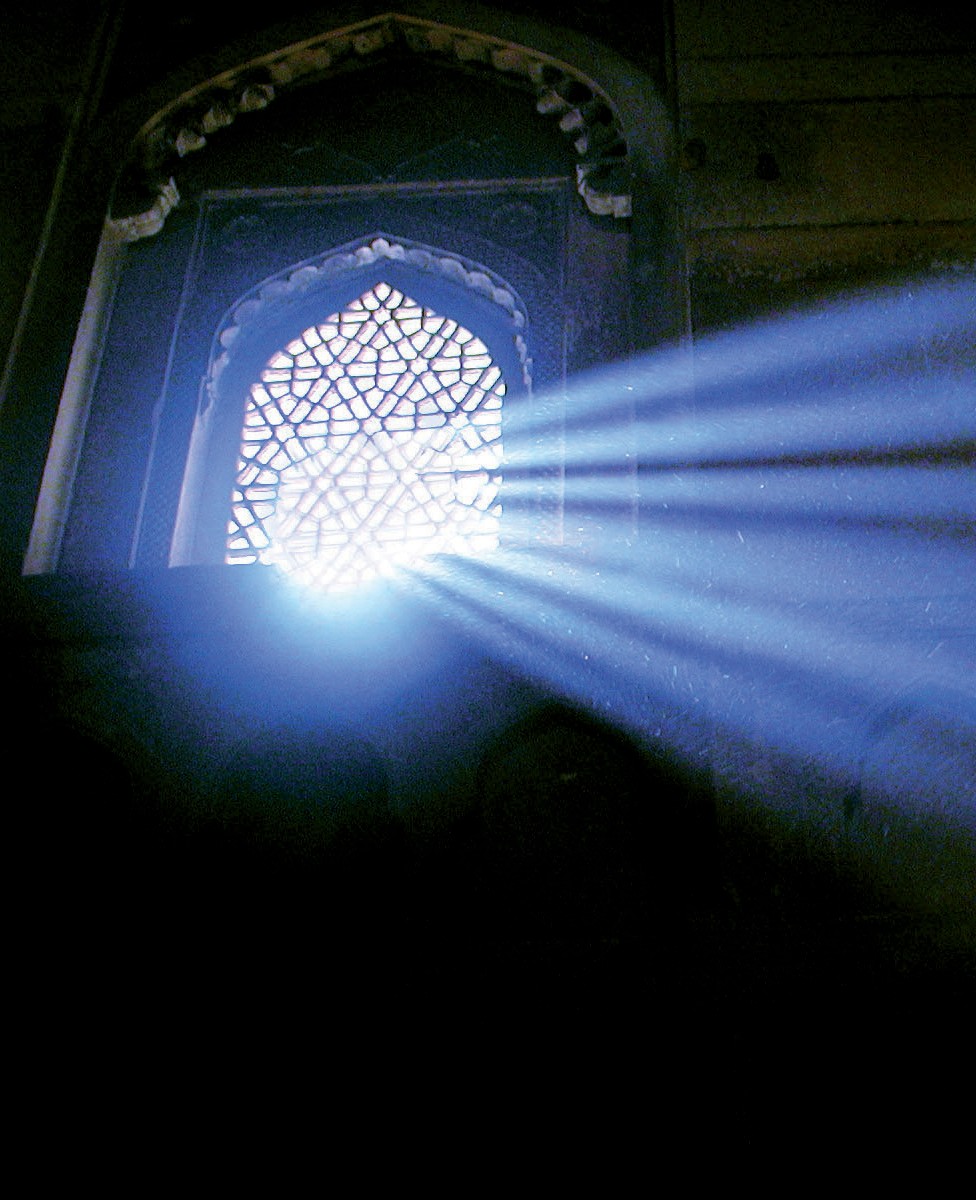
Benefits of Belief in Allah ﷻ
Some Benefits of Belief in Allah ﷻ
1
Allah safeguards the believers against harm and adversity and protects them against their enemies’ plots, as the Qur’an states, “Surely Allah defends those who are true believers.” (Soorat Al-Hajj, 22:38)
2
Belief in Allah brings happiness and is the source of a good life, as the Qur’an states, “To whoever does good deeds, man or woman, and is a believer, We will surely give a good life.” (Soorat An-Nahl, 16:97)
3
Belief in Allah frees the human mind from superstitions. Those who believe in Allah ﷻ completely rely on Him and are wholly devoted to Him, being the Lord of all the worlds and the only true God without any partners. As a result, they do not fear anyone and show their devotion to none but Allah. This frees them from all superstitions and misconceptions.
4
The best benefit of belief in Allah is attainment of Allah’s good pleasure, admission into Paradise and enjoyment of everlasting bliss and Allah’s boundless mercy.

Belief in the Angels
The Meaning of Belief in Allah’s Angels |
This means firm belief that they exist, that they belong to the unseen world, not our world, and that they are honoured and pious servants who worship Allah as He deserves to be worshipped, execute His commands and never disobey Him.
The Qur’an says about them, “They are honoured servants. They do not precede Him in speech and they act on His command.” (Soorat Al-Anbiyyaa’, 21:26-7)
Belief in them is one of the six pillars of eemaan (faith), as the Qur’an states, “The Messenger believes in that which has been revealed to him from his Lord and so do the believers. Each one believes in Allah and His angels and His books and His messengers.” (Soorat Al-Baqarah, 2:285)
When the Prophet ﷺ was asked about faith, he said, “It is to believe in Allah, His angels, His books, His messengers, the Last Day and to believe in the divine decree, the good and the bad of it.” (Saheeh Muslim: 8)
What Does Belief in the Angels Include? |
1
Belief in their existence: We believe that Allah made them from light and created them with a natural predisposition to worship and obey Him.
2
Belief in those angels whose names have been mentioned to us, such as Jibreel (Gabriel). We also generally believe in all those whose names have not been mentioned to us.
3
Belief in their attributes that have been mentioned to us. These include the following:
| • They belong to the unseen world whom Almighty Allah created solely for His worship. They have no divine attributes whatsoever and are naturally disposed to show complete obedience to Allah, as the Qur’an states, “They do not disobey Allah in respect of any order He gives them and carry out what they are ordered to do.” (Soorat At-Tahreem, 66:6). |
| • Allah created them from light, as evidenced by the hadeeth, “The angels were created from light.” (Saheeh Muslim: 2996). |
| • They have wings, as the Qur’an states, “All praise is due to Allah, the Originator of the heavens and the earth, who made the angels messengers with two, three or four pairs of wings. He increases in creation what He pleases; surely, Allah has power over all things.” (Soorat Faatir, 35:1). |
4
Belief in the duties which have been mentioned to us and which they carry out with Allah’s command. These include:
| • The angel charged with the task of conveying Allah’s revelation to His messengers, namely, Jibreel (Gabriel). |
| • The angel charged with the task of taking away the souls of those destined to die, namely the Angel of Death and his assistants. |
| • The angels charged with the task of recording all the good and bad deeds people do, known as the Noble Scribes (al-kiraam al-kaatiboon). |
Benefits of Belief in the Angels |
Belief in the angels has numerous benefits in the believer’s life. These include the following:
1
Being aware of Allah’s absolute strength and power: The magnificent and great creation of the angels clearly testify to the greatness of their Creator. The fact that Allah ﷻ created the mighty angels from light and with wings makes us appreciate His attributes with the importance and appreciation that He deserves and revere Him even more.
2
Observing righteousness: The firm belief that some angels record all our deeds prompts us to fear Allah ﷻ and to try not to disobey Him, whether we are alone or with others.
3
Observing patience while carrying out our duties towards Allah: When we become aware of the infinite number of angels in this vast universe who obey Allah and constantly worship Him, along with us, as He should be worshipped, we become prompted to endure all the adversities in carrying out our duties towards Allah. We also experience a great feeling of joy and reassurance.
4
Showing gratitude to Allah: The fact that Almighty Allah has created some angels whose task is to guard people against harm prompts us to thank Him for His divine care.

The Prophet ﷺ informs us in a hadeeth that there is no space in the seven heavens a foot length or a hand-span or a palm’s width which does not have an angel standing, bowing or prostrating.
Belief in the Divine Books
The Meaning of Belief in the Divine Books |
This means firm belief that Almighty Allah has sent down some divine books to some of His messengers, and that they contain the speech of Allah which must be thought of in a manner that suits His majesty. These books also contain the truth, light and guidance for people in both this world and in the hereafter.
Belief in the divine books is one of the six pillars of faith, as the Qur’an states, “O you who believe, believe in Allah and His Messenger and the Book which He has revealed to His Messenger and the Books which He revealed before.” (Soorat An-Nisaa’, 4:136)
In this verse, Almighty Allah commands the believers to believe in Him and His Messenger and the book which He revealed to His Messenger ﷺ, namely, the Qur’an. He also commands them to believe in all the books He revealed before the Qur’an.
Defining faith (eemaan), the Prophet ﷺ once said, “It is to believe in Allah, His angels, His books, His messengers, and the Last Day and to believe in the divine decree, both good and bad.” (Saheeh Muslim: 8)

The Holy Qur’an is written with great skill and precision, based on strict calligraphy rules.
What Does Belief in the Divine Books Include? |
1
To believe that they were truly revealed by Allah.
2
To believe that they contain the speech of Allah ﷻ.
3
To believe in the divine books which Almighty Allah has named, such as the Qur’an, which He revealed to our Prophet Muhammad ﷺ, the Torah (At-Tawraah) which He revealed to Moses (Moosaa) and the Gospel (AlInjeel) which He revealed to Jesus (‛Eesaa)
4
To believe the authentic stories mentioned in them.
The Unique and Distinctive Characteristics of the Qur’an |
The Holy Qur’an is the Speech of Allah, which He revealed to our Prophet Muhammad ﷺ. Therefore, we ought to venerate it, read it, ponder its verses and strive hard to abide by its instructions.
Suffice it to say that the Qur’an is our guide in this life and will be the cause of our salvation in the hereafter.
The Holy Qur’an has numerous unique features which distinguish it from the other revealed books. These include the following:
1
The Glorious Qur’an provides a summary of divine rulings. It also came to support and confirm the command to worship Allah alone contained in the previous divine books.
The Qur’an says, “And We have revealed to you the Book with the truth, confirming the books before it and with final authority over them. (Soorat Al-Maa’idah, 5:48)
This verse makes it clear that the Qur’an agrees with and confirms the truth, statements and beliefs, amongst other things, contained in the previous divine books and serves as a witness over them.
2
All people, regardless of their language or race, must adhere to the Qur’an and act according to its dictates, no matter how far removed they may be from the time the Qur’an was revealed, as opposed to the previous scriptures which were revealed for particular peoples at specific times. The Qur’an says, “This Qur’an has been revealed to me so that I may warn you by it, and anyone else it reaches.” (Soorat Al-An‛aam, 6:19)
3
While many additions and deletions have crept into the other divine books, the Qur’an has remained intact because Allah the Almighty has taken it upon Himself to protect it, as the Qur’an says, “We have sent down the Reminder, and We will surely guard it [from corruption].” (Soorat al-Hijr, 15:9)
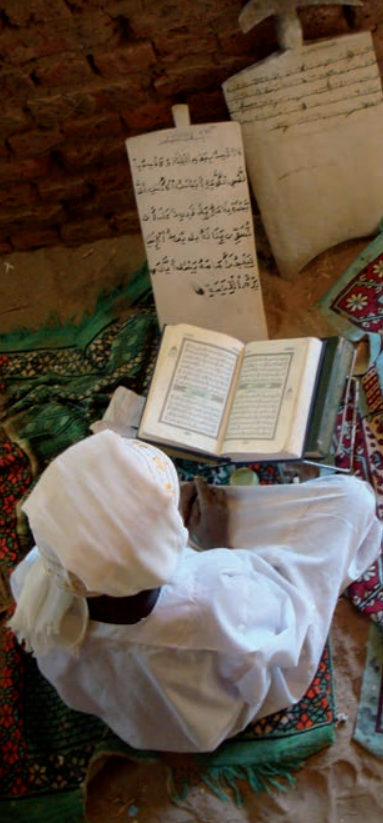
What Is Our Duty Towards the Qur’an?
- We must love and venerate the Qur’an. We must also value its importance because it is the speech of Almighty Allah ﷻ, which is unquestionably the best and most truthful speech.
- We must read it, recite it and ponder its verses. We must also reflect on its spiritual guidance, statements and stories and take it as a criterion in our lives whereby we distinguish between truth and falsehood.
- We must act on its dictates, obey its commands and make them our way of life.
When ‛Aa’ishah , one of the Prophet’s wives, was asked about the character of the Prophet ﷺ, she replied, “His character was the Qur’an.” (Musnad Ahmad:24601; Saheeh Muslim: 746)
In other words, the Prophet ﷺ was the practical embodiment of the Qur’anic injunctions in all his actions and worldly life. Indeed, he followed the guidance of the Qur’an in its entirety and provided an excellent example for us to follow, as the Qur’an states, “You have an excellent model in the Messenger of Allah, for all who hope for Allah and the Last Day and remember Allah much.” (Soorat Al-Ahzaab, 33:21)

What Is Our Stance regarding the Contents of the Previously Revealed Books? |
A Muslim believes that the Torah, which was revealed to Moses , and the Gospel, which was revealed to Jesus , were the truth from Allah ﷻ. He also believes that they comprised rulings, guidance and lessons and news which had guidance and light for people in their worldly life and the life to come.
However, Almighty Allah informs us in the Holy Qur’an that the People of the Book, that is the Jews and the Christians, had distorted their divine books through alteration, omission or addition to the original text, and are thus not as authentic as Allah first revealed them.
The Torah, that is available today, is not the same Torah revealed to Moses , because the Jews corrupted the original text by altering it and changing numerous rulings in it, as the Qur’an states, “Some of the Jews distort the true meaning of words.” (Soorat An-Nisaa’, 4:46)
Similarly, the Gospel available to us today is not the same Gospel revealed to Jesus , for the Christians distorted it and altered a large number of its rulings. Concerning this, the Qur’an says: “Among them is a group who distort the Book with their tongues so that you think it is from the Book when it is not from the Book. They say, ‘It is from Allah,’ but it is not from Allah. They tell a lie against Allah and they know it.” (Soorat Aal ‛Imraan, 3:78)
“We also made a covenant with those who say, ‘We are Christians,’ and they too forgot a good portion of what they were reminded of. So We stirred up enmity and hatred between them until the Day of Rising when Allah will inform them about what they did.” (Soorat AlMaa’idah, 5:14)
The Holy Bible available to the People of the Book today, which consists of the Old Testament and the New Testament, has numerous wrong beliefs, misleading misconceptions and false statements and stories. We believe those statements and reports which are shown by the Qur’an or the sound Sunnah to be true, and we disbelieve those ones which are shown by the Qur’an and Sunnah to be false. As for the rest of the statements and reports, we must neither believe nor disbelieve them, because they are not proven in the Qur’an or Sunnah to be either true or false.
Despite all this, a Muslim ought to respect these books and must not demean or desecrate them, for they may still contain some of Allah’s speech which has not been distorted.
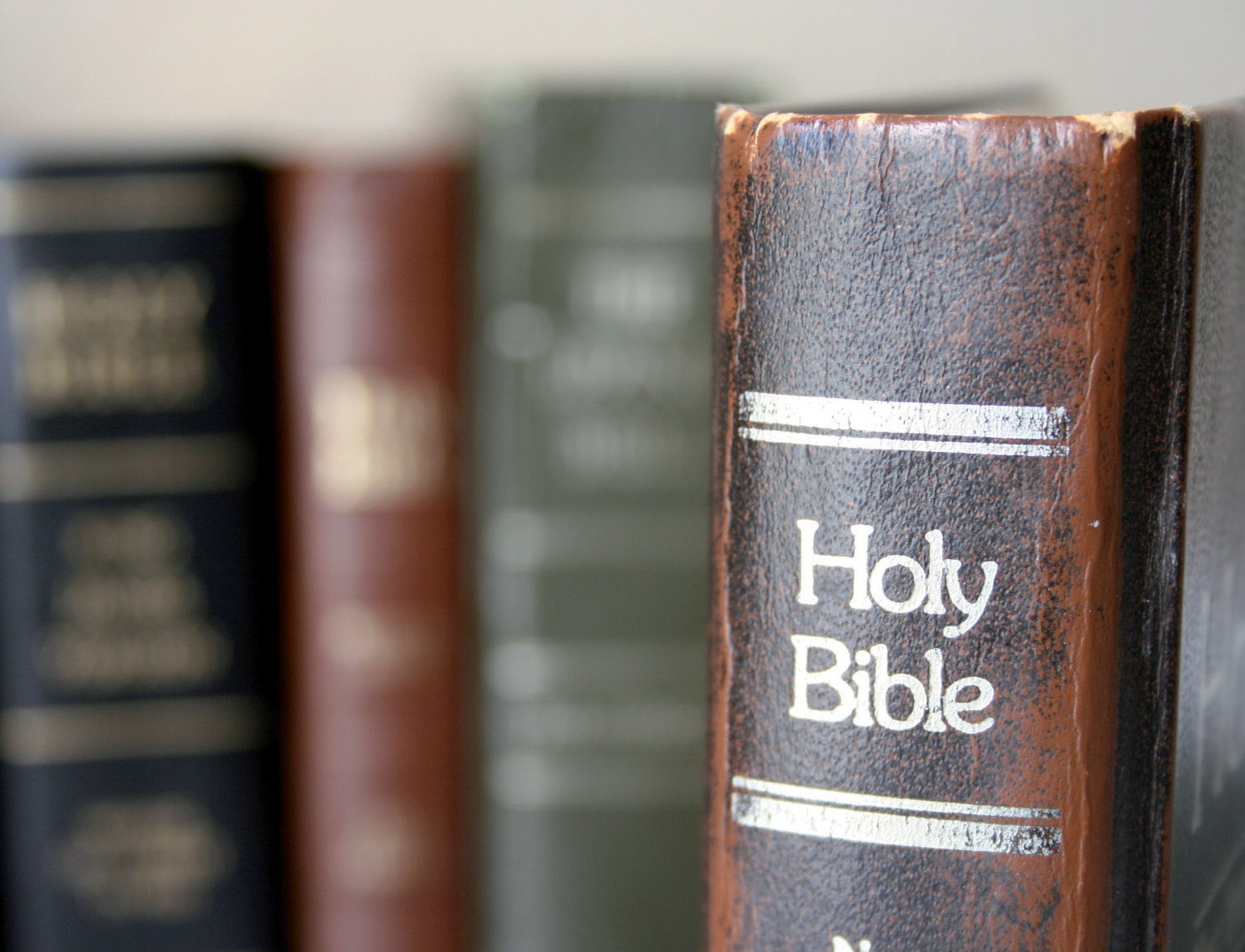
A Muslim believes that the Torah and the Gospel were revealed by Allah ﷻ but that many additions and deletions have crept into them. Therefore, he believes only those statements in them which agree with what is mentioned in the Qur’an and the Prophet’s traditions.
Benefits of Belief in the Divine Books |
Belief in the divine books has a number of benefits, including the following:
1
Awareness of Allah’s great care and immense mercy for His slaves for sending for every people a divine book to guide them, help them achieve happiness in this life and enjoy eternal bliss in the hereafter.
2
Awareness of Allah’s absolute wisdom contained in His laws, for legislating for every people what perfectly suits their general circumstances and personalities, as the Qur’an states, “For each [community to which a Messenger was sent with a Book] have We appointed a law and a practice.” (Soorat AlMaa’idah, 5:48)
3
Showing gratefulness to Allah for sending down such books which contain light and guidance for us in this life and in the hereafter. Indeed, this is a great blessing for which we ought to offer thanks to Allah.

Belief in the Messengers
People’s Need for a Divine Message |
People need a divine message to show them Allah’s laws and guide them to the right path. Indeed, a divine message is the spirit, light and the very life of the world, without which the world would certainly be lifeless and man would be plunged into the darkness of ignorance and misguidance.
It is for this reason that Almighty Allah calls His message a spirit, for there is no life without a spirit, as the Qur’an says, “We have thus revealed a Spirit to you by Our command. You knew neither the Scripture nor the faith, but We made it a light, guiding with it whomever We will of Our servants. You are indeed guiding to the straight path.” (Soorat Ash-Shooraa, 42:52)
Even though the intellect can generally distinguish between right and wrong, it cannot possibly comprehend the details of such a distinction, nor carry out acts of worship in the right manner without the dictates of revelation and the divine message.
Therefore, success and happiness can only be attained by following the guidance of Allah’s messengers. Similarly, no accurate line of demarcation can be drawn between right and wrong without following in their footsteps. Thus, whoever rejects the divine message will definitely lead a miserable and wretched life depending on the extent of their rejection of it.

It Is One of the Pillars of Faith |
Belief in Allah’s messengers is one of the six pillars of eemaan (faith), as the Qur’an states, “The Messenger believes in that which has been revealed to him from his Lord and so do the believers. Each one believes in Allah and His angels and His books and His messengers.” (Soorat Al-Baqarah, 2:285)
This verse makes it abundantly clear that we must believe in all of Allah’s messengers without making a distinction between any of them. We must not, therefore, believe in some of them and reject some others, as did the Jews and the Christians.
Defining eemaan (faith), the Prophet ﷺ also said in this connection, “It is to believe in Allah, His angels, His books, His messengers and the Last Day, and to believe in the divine decree, both good and bad.” (Saheeh Muslim: 8)
The Meaning of Belief in the Messengers |
This means firm belief that Allah ﷻ sent a messenger to every nation and community, calling its members to worship Allah alone without any partners, that all Allah’s messengers were truthful, virtuous, trustworthy and rightly-guided servants who strove hard to guide their people to the right path and conveyed Allah’s message to them in full, without concealing, omitting or adding anything to it. The Qur’an says, “Therefore, the messengers’ obligation is no more than to convey the message clearly.” (Soorat An-Nahl, 16:35)

What Does Belief in the Messengers Include? |
1
To believe that their message was truly from Allah ﷻ and that Allah had sent them with the same message, namely, to worship Allah alone and to avoid false gods, as the Qur’an states, “We sent a messenger among every people saying: ‘Worship Allah and keep clear of all false gods.’” (Soorat An-Nahl, 16:36)
Laws may vary as to the do’s and don’ts of the message with which prophets were sent to their people, depending on what laws suited their people best, as the Qur’an states, “For each [community to which a Messenger was sent with a Book] have We appointed a law and a practice.” (Soorat Al-Maa’idah, 5:48)
2
To believe in all the prophets and messengers. We believe in those prophets whom Allah has named, such as Noah, Abraham, Moses, Jesus and Muhammad, may Alloh’s peace and blessings be upon all of them. As for those whom He has not named, we believe in all of them in general. Those who disbelieve the message of one single prophet is considered to have disbelieved in all of them.
3
To believe the authentic reports and accounts of the prophets and their miracles mentioned in the Qur’an and in the Prophet’s traditions, such as the story of Allah’s parting the Red Sea for Moses .
4
To act according to the dictates of the law revealed to our Prophet Muhammad ﷺ, who was the seal of the prophets and the best of all of them.
| Some Characteristics of the Messengers |
|
| 1 |
They are human, and the only difference between us and them is that Allah had chosen them to receive His revelation and convey His divine message, as the Qur’an says, “We have only ever sent before you men to whom We revealed the message.” (Soorat Al-Anbiyyaa’, 21:7) Therefore, they have no divine attributes whatsoever. They are mere human beings who attained perfect physical appearance and enjoyed impeccable moral traits. They are also the most honourable of people in lineage and enjoyed sound judgement and clear, persuasive speech, which entitled them to assume the responsibility of conveying the divine message and bear the burden of prophethood. Almighty Allah ﷻ has only chosen messengers from among people so that they can set a good example for them, and so that people can follow in their footsteps, which they can possibly do. |
| 2 |
Allah ﷻ has chosen them from among people so they can convey the divine message to people, as the Qur’an states, “Say: ‘I am only a human being like you who has received revelation. Your god is One God. So let him who hopes to meet his Lord act rightly and not associate anyone in the worship of his Lord.’” (Soorat Al-Kahf, 18:110) It is clear, therefore, that prophethood cannot be attained as a result of spiritual purity, intelligence or mental logic, for the task of prophethood can only be determined by divine will, and Allah ﷻ knows best whom to appoint as His messengers, as the Qur’an states, “Allah knows best upon whom to bestow His message.” (Soorat Al-An‛aam, 6:124) |
| 3 | They are infallible in the sense that they do not make mistakes when conveying Allah’s message to the people and executing what Allah has revealed to them. |
| 4 | Truthfulness: They are truthful in their words and deeds, as the Qur’an states, “This is what the Most Merciful promised, and the messengers told the truth.” (Soorat Yaa Seen, 36:52) |
| 5 | Patience and Perseverance: They called to Allah’s religion, bringing good news and giving warning, and were subjected to various forms of harm and hardships, but they patiently bore all that for the sake of making the word of Allah reign supreme, as the Qur’an states, “So be steadfast as the Messengers with firm resolve were also steadfast.” (Soorat Al-Ahqaaf, 46:35) |
The Messengers’ Signs and Miracles |
Allah ﷻ supported His messengers with a number of signs and miracles to prove their truthfulness and prophethood.
A miracle, or mu‛jizah, is an extraordinary event in the physical world that surpasses all known human or natural powers. It is performed by prophets, by Allah’s command, for its credential value, to accredit them as Allah’s true messengers.
Examples of miracles include:
- Moses’s rod turning into a snake
- Jesus’s informing his people of what they ate and stored in their houses
- The splitting of the moon for Prophet Muhammad ﷺ
A Muslim’s Beliefs regarding Jesus |
1
He was one of the greatest of Allah’s messengers and one of those held in high esteem. Indeed, he is one of the messengers Allah describes in the Qur’an as having ‘firm resolve’, namely, Muhammad Noah, Abraham, Moses, Jesus, may Allah’s peace and blessings be upon all of them. About these prophets, the Qur’an states, “We made a covenant with all the Prophets – with you and with Noah and Abraham and Moses and Jesus son of Mary – We made a binding covenant with them.” (Soorat Al-Ahzaab, 33:7)
2
He was a mere human being with no divine attributes whatsoever, whom Almighty Allah sent to guide the Children of Israel and supported with a number of miracles, as the Qur’an states, “He is only a slave on whom We bestowed Our blessing and whom We made an example for the tribe of Israel.” (Soorat Az-Zukhruf, 43:59)
He never ordered his people to take him and his mother, Mary, as gods besides Allah; he only told them to do as Allah commanded him to tell them: “Worship Allah, my Lord and your Lord.” (Soorat Al-Maa’idah, 5:117)
3
He was the son of Mary, a chaste, pious and truthful virgin who entirely devoted herself to the worship of Allah. She gave birth to Jesus after miraculously conceiving him without a human father, his likeness in this being as that of Adam, as the Qur’an states, “The likeness of Jesus in Allah’s sight is the same as Adam. He created him from earth and then He said to him, ‘Be!’ and he was.” (Soorat Aal-‛Imraan, 3:59)
4
There was no prophet between him and Muhammad ﷺ. In fact, Jesus gave the good news of the advent of Prophet Muhammad ﷺ, as the Qur’an states, “And when Jesus son of Mary said, ‘O Children of Israel, I am the Messenger of Allah to you, confirming the Torah which came before me and giving you the good news of a Messenger to come after me whose name is Ahmad.’ When he brought them the Clear Signs, they said, ‘This is downright magic.’” (Soorat As-Saff, 61:6)
5
We believe in the miracles he performed by Allah’s permission, such as his ability to heal the lepers, bringing dead people back to life and informing his people of what they ate and stored in their houses, all by Allah’s permission. Allah gave him the ability to perform such miracles to prove he was a true prophet who came with a divine message from his Lord.
6
A person will not be considered a true believer unless he believes that Jesus was Allah’s servant and messenger and strongly rejects the false statements Jews make about him and which Allah dismisses as untrue. We must also strongly reject the Christian beliefs about Jesus, who have gone far astray for taking him and his mother as gods besides Allah, claiming that he was the son of God or adopting the doctrine of the Trinity, referring to Allah as “the third of three”. Glorified is He and High Exalted above what they say!
7
He was neither killed, nor crucified; instead, he was raised up by Allah to heaven. In fact, Allah gave someone else Jesus’ appearance, causing everyone to believe that Jesus was crucified. The Qur’an says about this, “And their saying, ‘We killed the Messiah, Jesus, son of Mary, the Messenger of Allah.’ They did not kill him and they did not crucify him but it was made to seem so to them. Those who argue about him are in doubt about it. They have no real knowledge of it, just conjecture. They did not really kill him. Allah raised him up to Himself. Allah is Almighty, All-Wise. There is not one of the People of the Book who will not believe in him before he dies; and on the Day of Rising he will be a witness against them.” (Soorat AnNisaa’, 4:157-59)
In this way, Allah ﷻ protected him and raised Him to heaven. He will eventually return to earth towards the end of the world, rule by Muhammad’s law; then he will die and be buried, and will eventually be resurrected, like all human beings, as the Qur’an states, “From it We created you, to it We will return you, and from it We will bring you forth a second time.” (Soorat Taa Haa, 2o:55)
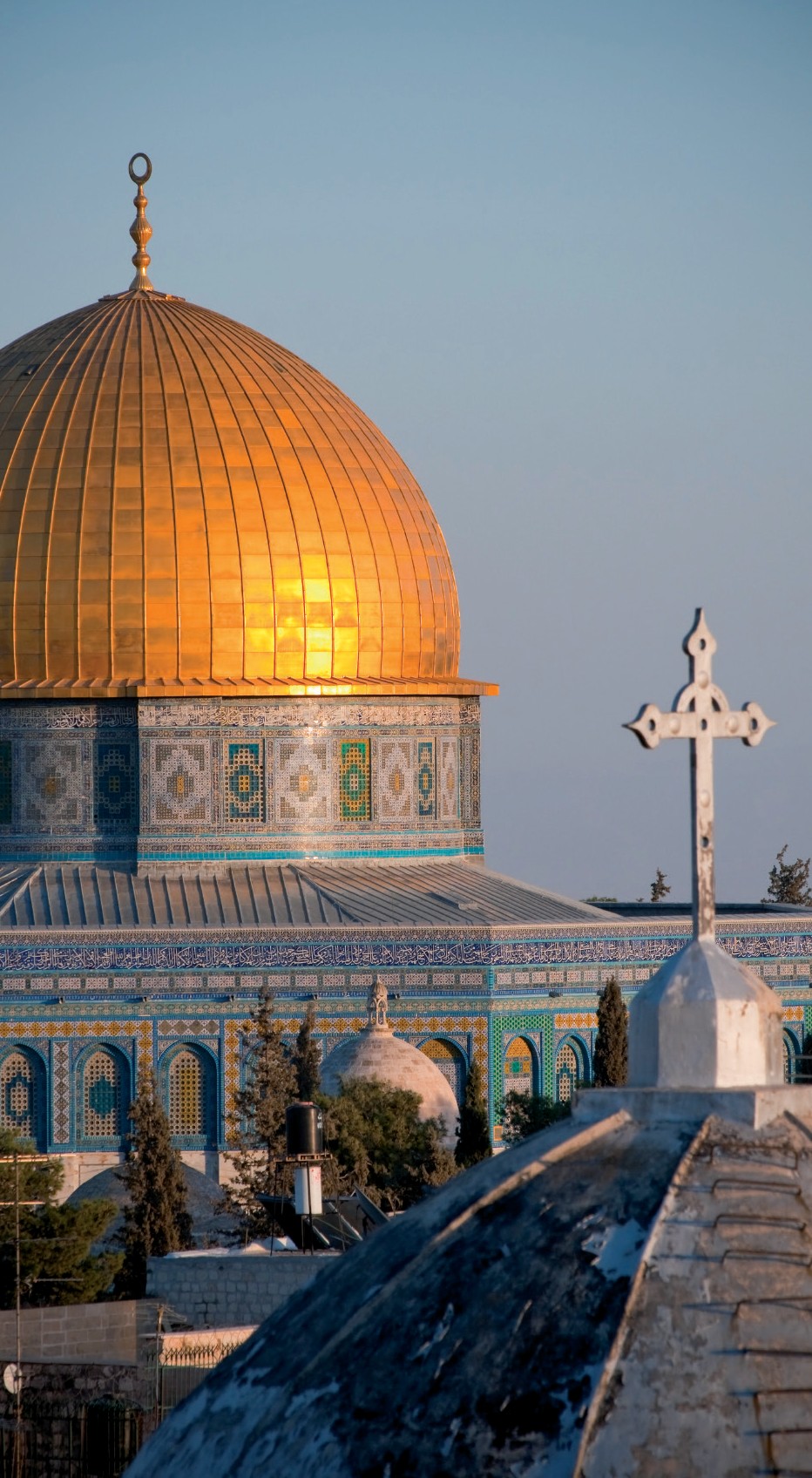
Muslims believe that Jesus was one of the greatest of Allah’s messengers, that he had no divine attributes whatsoever and that he was neither killed, nor crucified.
Belief in Muhammad ﷺ as a Prophet and Messenger |
- We believe that Muhammad ﷺ was Allah’s servant and messenger, that he is the best of all mankind without exception, the seal of the prophets and so there will be no prophet after him. He fully delivered the divine message assigned to him, discharged his prophetic duties, sincerely counselled the Muslim community, and strove hard for the cause of Allah to the best of his ability
- We believe what he said, obey his commands and avoid the acts he prohibited and warned us against. We must worship Allah according to his guidance (Sunnah) and take none but him as our example. The Qur’an says, “You have an excellent model in the Messenger of Allah, for all who hope for Allah and the Last Day and remember Allah much.” (Soorat AlAhzaab, 33:21)
- We must show more love for the Prophet ﷺ than for our own parents, children and indeed all humankind. “None of you will be a true believer,” the Prophet ﷺ once observed, “until he loves me more than his parents, his children and all mankind.” (Saheeh Al-Bukhaaree: 15 and Saheeh Muslim: 44). However, true love for the Prophet ﷺ can only be realised by following his Sunnah. Indeed, true happiness and complete guidance cannot be attained without obeying him, as the Qur’an states, “If you obey him, you will be guided.’ The Messenger is only responsible for delivering the message clearly.” (Soorat An-Noor, 24:54)
- We must accept everything he has brought to us from Almighty Allah, adhere to his Sunnah, holding his guidance in high esteem, as the Qur’an states, “By your Lord, they will not be true believers until they seek your arbitration in their disputes and find within themselves no doubt about what you decide and accept it wholeheartedly.” (Soorat An-Nisaa’, 4:65)
- We must avoid disobeying his orders, for doing so is bound to lead to trials, misguidance and a severe punishment in the hereafter, as the Qur’an states, “Those who oppose his command should beware of a testing trial coming to them or a painful punishment striking them.” (Soorat An-Noor, 24:63)
Characteristics of Prophet Muhammad’s Message |
Prophet Muhammad’s message has a number of characteristics which distinguish it from the previous divine messages. These include:
- It was the final divine message, as the Qur’an states, “Muhammad is not the father of any of your men, but the Messenger of Allah and the Final Seal of the Prophets.” (Soorat Al-Ahzaab, 33:40)
- It abrogated all previous messages and laws, and thus no religion will be acceptable to Allah after Muhammad’s mission except Islam. This can only be done by following Prophet Muhammad’s guidance. Similarly, no one will be admitted into Paradise without following in his footsteps, for he is the most honourable of all Allah’s messengers, his community (ummah) is the best community that has ever been brought forth for the good of mankind and his law is the most comprehensive of all divine laws. The Qur’an says, “If anyone desires anything other than Islam as a religion, it will not be accepted from him, and in the next world he will be among the losers.” (Soorat Aal-‛Imraan, 3:85) The Prophet ﷺ also said, «By Him in whose hand is the soul of Muhammad, any person of this Community, Jew or Christian, who hears of me and dies without believing in what I have been sent with will be among the inhabitants of Hell.” (Saheeh Muslim: 153; Musnad Ahmad: 8609)
- It is addressed to both the jinn and mankind. Recounting the statements of some of the jinn who embraced Islam, the Qur’an states, “Our people, respond to Allah’s caller and believe in Him.” (Soorat Al-Ahqaaf, 46:31) Addressing Muhammad ﷺ, the Qur’an also says, “We only sent you for the whole of mankind, bringing good news and giving warning.” (Soorat Saba’, 34:28) In this connection, the Prophet ﷺ said, “I have been favoured over the other prophets in six ways: I have been given the gift of concise yet comprehensive speech; I have been supported with fear [which Allah cats into my enemies’ hearts]; war booty has been made permissible for me; the entire earth has been made a means of purification and a place of worship for me; I have been sent to all of mankind; and the line of Prophets ends with me.” (Saheeh AlBukhaaree: 2815; Saheeh Muslim: 523)
Benefits of Belief in Allah’s Messengers |
Belief in Allah’s messengers has a number of benefits, including the following:
1
Awareness of Allah’s care for His slaves for sending messengers to them to guide them to the right path and show them how to worship Allah. Indeed, the human mind cannot possibly do this. Addressing Prophet Muhammad ﷺ, Allah ﷻ says, “We have only sent you as a mercy to all the worlds.” (Soorat Al-Anbiyaa’, 21:107)
2
Showing gratefulness to Allah for this great blessing.
3
Showing love for Allah’s messengers, holding them in high esteem and adequately praising them for delivering Allah’s message to their people and giving them good counsel.
4
Following the guidance contained in the message which the messengers have brought from Allah, namely, to worship Allah alone without associating any partners with Him in worship and adhering to the dictates of this message. This will bring about happiness for the believers in both this life and in the life to come.
The Qur’an says, “Those who follow My guidance will not go astray and will not be wretched. But whoever turns away from My reminder, he will lead a miserable life.” (Soorat Taa Haa, 20:123-24)
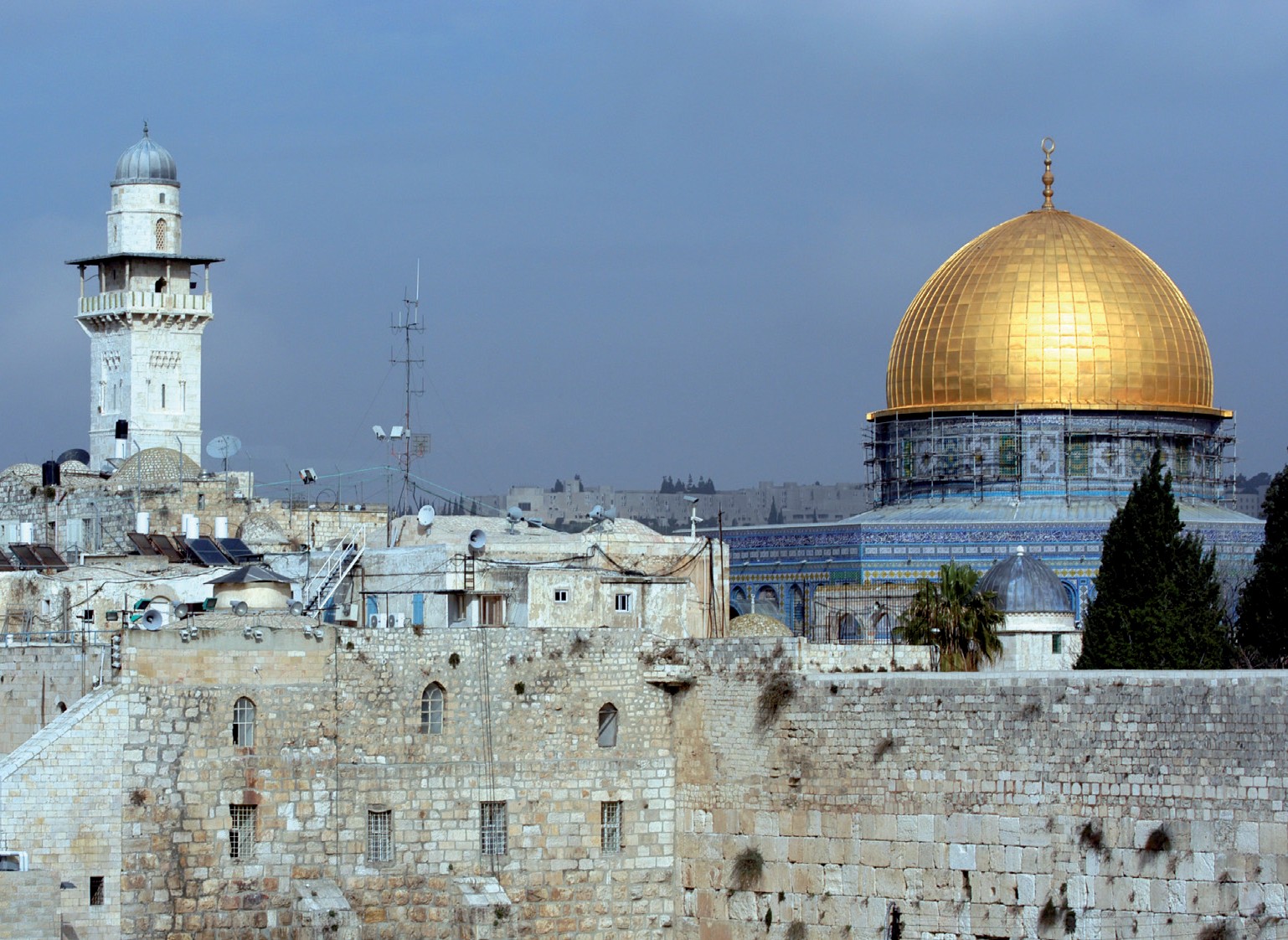
Al-Aqsa Mosque, located in the old city of Jerusalem, is regarded by Muslims with great respect. It is the second mosque built upon the earth after the Sacred Mosque in Makkah. Indeed, Prophet Muhammad ﷺ, as well as all the other prophets, prayed in it.
Belief in the Last Day
Meaning of Belief in the Last Day |
Firm belief that Almighty Allah will raise people to life from their graves; He will then judge them according to their deeds. Those who deserve to go to Paradise will be sent to it, while those who deserve to go to Hellfire will be sent to it.
Belief in the last Day is one of the articles of faith, and faith will not be valid unless one believes in the Last Day, as the Qur’an states, “Truly pious are those who believe in Allah and the Last Day.” (Soorat Al-Baqarah, 2:177)
Why Does the Qur’an Emphasise Belief in the Last Day? |
The Qur’an emphasises belief in the last Day and draws attention to it on numerous occasions, employing different modes of expression in Arabic and linking belief in the Last Day with belief in Allah.
The reason for this is that belief in the Last Day is a necessary outcome of belief in Almighty Allah and His absolute justice. To illustrate:
Allah does not approve of injustice; He will not let the wrongdoers go unpunished, nor will He let the wronged down by not having them obtaining redress for the wrong done to them, nor will He disappoint the virtuous by not rewarding them for their righteousness. Many are those who spent all their lives oppressing others with impunity until they died; many are those who suffered a great deal of injustice and died without ever obtaining redress for the wrong done to them. This means there has to be another life, other than the present life, where the righteous will be rewarded and the evildoers will be punished, everyone getting the reward or punishment they deserve.

Islam teaches us to save ourselves from Hellfire by showing kindness to others even by giving half of a date-fruit in charity.
What Does Belief in the Last Day Include? |
Belief in the Last Day includes a number of things, some of which are as follow:
1
Belief in the Ultimate Resurrection and Gathering: This means that Almighty Allah will raise people to life from their graves, and each soul will return to its respective body. People will then stand before the Lord of all the worlds for judgement. They will be gathered on a huge level plain, naked and barefooted just as Allah ﷻ first created them.
Indeed, belief in the resurrection of the dead is confirmed by textual evidence from the Qur’an and the Sunnah and has been proven rationally as well as through the inner nature (fitrah). We therefore firmly believe that Allah will raise the dead from their graves, their souls will return to their respective bodies and all people will stand before the Lord of the worlds for judgement.
The Qur’an says, “Then subsequently you will certainly die. Then on the Day of Rising you will be raised again.” (Soorat Al-Mu’minoon, 23:15-16)
All divine books have confirmed this fact, stating that part of Allah’s wisdom behind creating people is to set an ultimate day on which He will judge them for obeying or rejecting His commands which he sent down to them through His messengers, as the Qur’an states, “Did you suppose that We created you for amusement and that you would not return to Us?’” (Soorat Al-Mu’minoon, 23:115)
|
Some Textual Evidence from the Qur’an Regarding Resurrection
|
2
Belief in the Judgement and the Balance of Deeds: Almighty Allah will judge people according to their deeds which they did in the life of the world. Those who worship Allah alone and obey Him and His Messenger Muhammad ﷺ will receive an easy reckoning. As for those who commit the unforgivable sin of shirk and disobey Him, they will receive a severe reckoning.
People’s deeds will be weighed in a huge balance. The good deeds will be placed on one weighing pan, while the bad deeds will be placed on the pan at the other end of the Balance. Those whose good deeds outweigh their bad deeds will be admitted into Paradise, while those whose bad deeds outweigh their good deeds will be sent to Hellfire, and Allah does not wrong anyone.
Allah ﷻ say, “We will set up the Just Balance on the Day of Rising and no one will be wronged in any way. Even if it is no more than the weight of a grain of mustardseed, We will produce it. We are sufficient as a Reckoner.” (Soorat Al-Anbiyyaa’, 21:47)
3
Paradise and Hellfire: Paradise is the abode of eternal bliss which Allah ﷺ has prepared for the pious people who have obeyed Allah and His Messenger ﷺ. In it they will find all that their hearts desire and their eyes find delight in.
Awakening His servants’ desire to vie with one another in obeying Him so that they will be admitted into Paradise, Almighty Allah says, “Race each other to forgiveness from your Lord and a Garden as wide as the heavens and the earth, prepared for the righteous.” (Soorat Aal-‛Imraan, 3:133)
As for Hellfire, it is the abode of eternal punishment which Allah has prepared for the unbelievers who have rejected Allah and disobeyed His messengers. In it they will find all kinds of unimaginable terrifying punishments and suffering.
Warning His servants against the Hellfire, Almighty Allah says, “Fear the Fire whose fuel is people and stones, made ready for the unbelievers.” (Soorat Al-Baqarah, 2:24)
We ask You, O Allah, to admit us into Paradise and to assist us in saying words and doing deeds that are bound to bring us closer to it, and we seek refuge with You from the Hellfire and from words and deeds that are bound to bring us closer to it.
4
Punishment and Bliss in the Grave: We believe that death is a fact, as the Qur’an states, “Say: ‘The Angel of Death, who has been given charge of you, will take you back and then you will be sent back to your Lord.’” (Soorat As-Sajdah, 32:11)
In fact, no one can deny death; we believe that when someone dies or is killed by any means whatsoever, it is because his appointed time has come, which he can neither delay nor bring forward, as the Qur’an states, “When the end of the term falls, they can neither delay it by a single moment, nor can they hasten it.” (Soorat Al-A‛raaf, 7:34)
• We also believe that whoever dies has actually moved to life hereafter.
• There are numerous authentic traditions attributed to Prophet Muhammad ﷺ in which he mentions punishment in the grave for the unbelievers and the wicked people and bliss for the believers and upright people. We believe in all this, but we abstain from trying to find out how this may happen, for the human mind cannot possibly comprehend its manner or reality, being part of the unseen world, such as Hellfire and Paradise, and not part of the material, visible world. The human mind can only carry out analogical reasoning and deductive arguments and reach judgements in matters which have the same relationship and whose laws are known in the visible world.
• Life in the grave is part of the unseen world which cannot be perceived by the senses. Were this possible, belief in the unseen would be of no benefit whatsoever, there would be no wisdom behind observance of religious duties and people would not find it necessary to bury the dead. As the Prophet ﷺ once observed, “Were it not that you would not bury one another, I would pray to Allah to make you hear the punishment in the grave which I can hear.” (Saheeh Muslim: 2868; Sunan An-Nasaa’ee: 2058). It is because animals are exempt from religious duties that they can hear the voices of those punished in their graves.

Benefits of Belief in the Last Day |
1
Belief in the Last Day prompts people to lead a pious life, do righteous deeds, fear Allah ﷻ and stay away from selfishness and arrogance.
It is for this reason that the Qur’an frequently links belief in the Last Day with righteous deeds. The following verses are examples showing this: “The mosques of Allah should only be frequented by those who believe in Allah and the Last Day.” (Soorat At-Tawbah, 9:18)
“Those who believe in the hereafter do believe in it, and they are ever-mindful of their prayers.” (Soorat Al-Ana‛am, 6:92)
2
It reminds those who are totally absorbed in the life of the world and its transitory pleasures of the importance of vying with one another to obey Allah, urging them to do as many good deeds as long as they are alive and showing them that the worldly life is fleeting and that the hereafter is the everlasting abode.
After praising His messengers in the Qur’an and mentioning their righteous deeds, Allah ﷻ mentions the reason that prompted them to do such virtuous acts: “We purified their sincerity through sincere remembrance of the Abode.” (Soorat Saad, 38:46)
This means that their constant remembrance of the hereafter was the reason behind their performance of such acts.
When some of the Muslims became too sluggish to obey Allah and His Messenger ﷺ on one occasion, Allah ﷻ revealed the following verse, “Do you prefer the life of this world to the hereafter? But little is the comfort of this life, compared to that of the hereafter.” (Soorat At-Tawbah, 9:38)
Belief in the hereafter makes a person realise that all worldly comforts cannot be possibly compared to the eternal bliss in Paradise, nor is it worth one single dip in Hellfire; conversely, it makes one realise that all worldly discomforts and hardships for the sake of Allah cannot be possibly compared to punishment, in Hellfire, nor will it be compared to even one dip in Paradise.
3
It makes a person satisfied with his lot in life. He does not feel sad or lose heart if he misses a worldly opportunity. Rather, he does what he can possibly do, knowing for certain that Allah will not let the reward of anyone who does a good deed go to waste. If anything has been unjustly or deceitfully taken away from him, even if it is smaller than an atom, he will certainly get it back on the Day of Judgement when he will be in dire need of it. How then can someone feel sad when he knows for sure that he will get his rightful dues at a very critical moment on the Day of Judgement? How can he possibly grieve or be worried when he knows that it is the Best of Judges who will judge between him and his adversaries?
Belief in the Divine Decree
What Does Belief in the Divine decree Mean? |
This means firm belief that everything, good and bad, takes place by the will of Allah, who does whatever He desires. Nothing can happen without His will, and not even the like of a weight of an atom in the heavens or the earth escapes His knowledge. However, He commands His servants to do certain acts and forbids them to do certain others, giving them free will to do whatever they please without being forced to do anything against their will. He created them as well as their ability to do things. He guides whomever He wills in His mercy and misguides whomever He wills in His absolute wisdom. He will not be questioned about what He does, but people will be questioned for what they do.
| Belief in the divine decree is one of the pillars of faith. When the prophet ﷺ was once asked about faith, he said, “It is to believe in Allah, His angels, His books, His messengers, the Last Day and to believe in the divine decree, the good and the bad of it.” (Saheeh Muslim: 8) |
What Does Belief in the Divine Decree Include? |
Belief in Allah’s decree includes the following:
- The belief that Allah ﷻ knows everything and that He knew everything about His creation even before He brought them into being. His foreknowledge includes their provisions, their appointed time in life, their words and deeds, all their doings, whatever they conceal and reveal, those who will be admitted into Paradise as well as those who will be sent to Hellfire. The Qur’an says, “He is Allah, other than Whom there is no other god, the Knower of the Invisible and the Visible.” (Soorat Al-Hashr, 59:22)
- The belief that He recorded everything that will exist according to His prior knowledge in the Preserved Tablet (Book of Decrees), as the Qur’an states, “No misfortune can happen on earth or in yourselves but is recorded in a Book before We bring it into being.” (Soorat Al-Hadeed, 57:22) The prophet ﷺ also said in this connection, “Allah recorded the measurement of all matters pertaining to creation fifty thousand years before He created the heavens and the earth.” (Saheeh Muslim: 2653)
- The belief that Allah’s will is absolute and cannot be frustrated or challenged by any power whatsoever. Indeed, everything takes place according to His will. Whatever He wills certainly takes place and whatever he does not will cannot possibly take place. The Qur’an says, “But you will not will unless Allah wills, the Lord of all the Worlds.” (Soorat At-Takweer, 81:29)
- The belief that Allah ﷻ is the originator of everything, that He is the only Creator besides whom there is no creator, that everything in existence was created by Him and that He has power over all things, as the Qur’an states, “He created everything and determined it most exactly.” (Soorat Al-Furqaan, 25:2)
Man Has Free Will, Free Choice and the Ability to Do as he Pleases |
Belief in the divine decree in no way implies that man does not have free will or that he cannot choose his own actions. This can be proven by Islamic textual evidence as well as by concrete evidence in the real world.
The Qur’an says, “That is the Day of Truth. So whoever wills should take the path that leads to his Lord.” (Soorat An-Naba’, 78:39)
Regarding man’s power and will to do as he chooses, the Qur’an states, “Allah will not force any soul beyond its capacity: It shall have the good which it has gained, and it shall suffer the evil which it has gained.” (Soorat Al-Baqarah, 2:286)
Based on concrete evidence in the real world, every person knows that he has the free will and ability to do whatever he wants. With these, he can choose between things. He can do some things willingly, such as walking, but he cannot possibly do some other things willingly, such as shivering or a sudden fall. It remains to be said that man’s will and ability can only take place following those of Almighty Allah, as the Qur’an states, “It is nothing but a Reminder to all the worlds to whoever among you wishes to go straight. But you will not will unless Allah wills, the Lord of all the Worlds.” (Soorat At-Takweer, 81:27-9)

“We have shown him the way, whether he be grateful or ungrateful.” (Soorat Al-Insaan, 76:3) .
Using Divine Decree as an Excuse to Commit Sins |
The obligations of observing religious duties, abiding by divine commands and avoiding divine prohibitions is conditional upon man’s free will and ability to do as he chooses. Accordingly, the virtuous will be rewarded for choosing the path of righteousness, and the evil will be punished for choosing the path of wickedness.
Almighty Allah ﷻ does not impose a duty upon us that is beyond our capacity, and He does not want any one of us to neglect his religious duties by using divine decree as an excuse.
Besides, Allah ﷻ has endowed us with free will and the ability to choose our own actions and has clearly pointed to us the path of righteousness and that of wickedness. Therefore, if we disobey Allah, such disobedience comes only of our own choosing and thus we will have to bear the consequences of this choice.
If a person assaulted you, harmed you and robbed you of your money, claiming that he had done this because it had been decreed by Allah, you would certainly consider his excuse completely absurd and unacceptable, and you would definitely punish him and claim your money because he had actually done this entirely of his own volition.
Benefits of Belief in the Divine Decree |
Belief in the divine decree has numerous benefits in people’s lives, including the following:
1
It is one of the best incentives to act in a manner that is pleasing to Almighty Allah in this life.
The believers are commanded to do what they can possibly do, to the best of their ability, relying upon Allah ﷻ. They believe that whatever they do cannot possibly yield any results without Allah’s will, because Allah is the Creator of the causes and effects.
The prophet ﷺ once said, “Cherish that which gives you benefit [in the Hereafter], seek help from Allah and do not lose heart. If anything unpleasant happens to you, do not say, ‘If I had done such-and-such, such-and-such would have happened instead.’ Rather say, ‘Qaddarallaahu wa maa shaa’a fa'ala (This is Allah’s decree, and He does whatever He wills)’, for the words ‘if only’ begin the work of Satan.” (Saheeh Muslim: 2664)
2
Belief in divine decree prompts man to realise his own self worth, and so he tries to avoid self-conceit and arrogance, for he knows that he does not know what has been decreed for him. This makes him admit his weakness and need for Allah ﷻ and thus urges him to turn to Him constantly.
Generally, man becomes conceited when something good happens to him and becomes rather sad and dejected when something bad befalls him. Only belief in the divine decree will protect man from such arrogance in times of ease and dejection in times of hardship, for he knows that things happen according to Allah’s decree and His foreknowledge.
3
Belief in divine decree helps overcome the vice of envy. A true believer does not envy people for the bounties Allah has bestowed upon them, for He knows that it is Allah ﷻ who has granted them such bounties in the first place and that envying others is tantamount to objecting to Allah’s decree.
4
It fills the believer’s heart with courage and strengthens his determination in the face of hardships, for he knows that his worldly provision and appointed time to depart the world has already been decreed by Allah ﷻ and that nothing will happen to him except what Allah has decreed for him.
5
It instils in him the numerous realities of faith. Consequently, he constantly seeks Allah’s assistance, places his trust in Allah after doing what is required of him and always shows his need for Allah from whom he derives support to stay on the straight path.
6
It provides him with reassurance and fills his heart with peace and contentment, for he knows that what has passed him by was not going to befall him and that what has befallen him was not going to pass him by.



